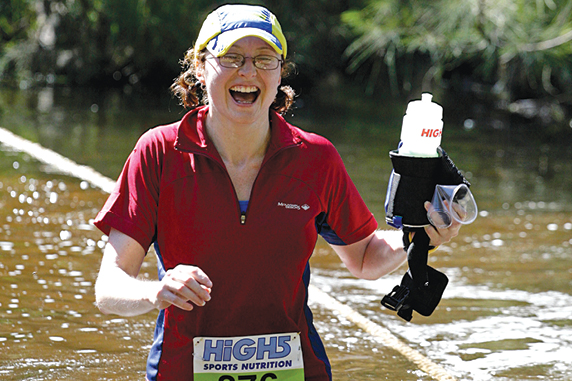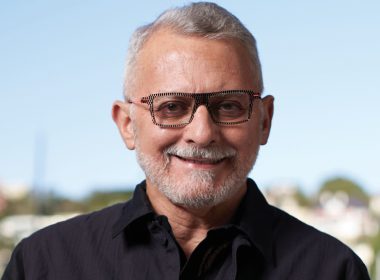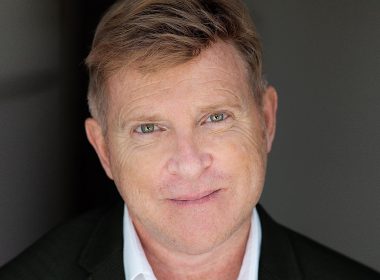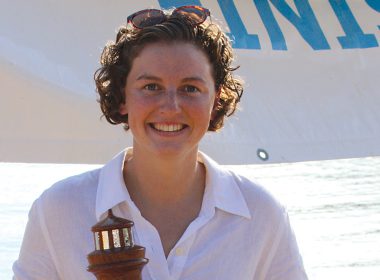I’ve always loved drafting contracts – that’s probably the nerdiest thing I’ll ever say, but there’s something really special about creating something that didn’t exist before.
Jen Brown was working in private practice when she took up running. Step by step, she ended up on a path she never could have anticipated.
It’s 10.30 on a sunny Saturday morning at Glenbrook, in the Blue Mountains, and Jen Brown has already been for a 13km run through the nearby bush. She’s easy to spot: fit, rosy-cheeked and smiling, wearing a crisp white visor with the words “Sparta Chicks” emblazoned on the front.
“It was very humid,” she says as she sits down at the table and orders a coffee. “I started from Glenbrook train station, I ran into the national park and up to Mount Portal, to the lookout. It’s a great spot.”
Brown is a former corporate and commercial solicitor who literally and figuratively ran away from her career after stumbling on a passion for the sport. She built a successful running and triathlon coaching business out of it, based in Penrith, as well as a podcast that has just hit 200,000 downloads.
At the time of writing, Brown has published 126 episodes. Each features an interview with an athlete or adventurer, including Olympic medallists like aerial skier Lydia Lassila and beach volleyballer Natalie Cook. It’s all about breaking down common misconceptions around training and competing.
Ostensibly, it’s a podcast for athletes. But Brown tackles universal human issues such as courage, failure and self-imposed limitations, as she examines the mental hurdles her guests have overcome to pursue their goals. These themes have attracted an audience reaching far beyond the sporting community, attracting a rating of 4.9 out of a possible five stars on Apple Podcasts along the way.
“We’re having conversations that aren’t being talked about elsewhere. My guests have been brutally and painfully honest about their vulnerabilities and experiences,” she says.
“We all share the same fear and self-doubt. [You might say] ‘I’ve got these goals but I’m too scared to try’, ‘I feel like a fraud’, ‘I don’t belong here’, ‘I don’t deserve this’. We all share those. When you hear someone have those conversations, you start to realise you’re not the only one.”
Brown was admitted to the Supreme Court of New South Wales in 1999 and spent about a decade in private practice before taking a break to travel. On her return, she accepted what she thought would be a three-month in-house role to privatise the body formerly known as Waste NSW. She ended up leading the project for the next two-and-a-half years.
“It was always my passion. Even from university, there was something about corporate law I wanted to do. I blame LA Law, actually, the TV show. That’s showing my age now,” she laughs.
“I love putting things together, seeing all the different threads, finding out why parties want to achieve what they want to achieve and then trying to find the solution. That’s what I saw in corporate [law].”
She tells LSJ privatisation was a fascinating process that combined all the skills she had developed over the years in mergers and acquisitions. She was responsible for everything from the initial due diligence right through to the drafting of contracts and the eventual sale of the government’s assets.
“I’ve always loved drafting contracts – that’s probably the nerdiest thing I’ll ever say, but there’s something really special about creating something that didn’t exist before.”
Brown had always been relatively active, but never much of a runner, until the long hours at her desk took a toll on her fitness. She decided she needed to do something to build it back up, so she settled on a regular circuit around Mosman, where she was living at the time. One day, she opted to take a dirt path that disappeared to the side. In that moment, she stumbled upon her love of trail running.
“I remember thinking, ‘I wonder where that goes?’ It was a goat track. Literally within five or 10 metres I remember feeling joy. It was fun, it was hard, but there was something very joyful about it,” she tells LSJ. “I was hooked, absolutely – just like that. It was very much a lightbulb kind of moment.”
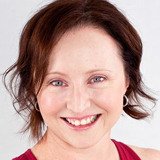 Jen Brown
Jen Brown
“It was always my passion. Even from university, there was something about corporate law I wanted to do. I blame LA Law, actually, the TV show. That’s showing my age now,” she laughs.
“I love putting things together, seeing all the different threads, finding out why parties want to achieve what they want to achieve and then trying to find the solution. That’s what I saw in corporate [law].”
She tells LSJ privatisation was a fascinating process that combined all the skills she had developed over the years in mergers and acquisitions. She was responsible for everything from the initial due diligence right through to the drafting of contracts and the eventual sale of the government’s assets.
“I’ve always loved drafting contracts – that’s probably the nerdiest thing I’ll ever say, but there’s something really special about creating something that didn’t exist before.”
Brown had always been relatively active, but never much of a runner, until the long hours at her desk took a toll on her fitness. She decided she needed to do something to build it back up, so she settled on a regular circuit around Mosman, where she was living at the time. One day, she opted to take a dirt path that disappeared to the side. In that moment, she stumbled upon her love of trail running.
“I remember thinking, ‘I wonder where that goes?’ It was a goat track. Literally within five or 10 metres I remember feeling joy. It was fun, it was hard, but there was something very joyful about it,” she tells LSJ. “I was hooked, absolutely – just like that. It was very much a lightbulb kind of moment.”
Brown became a certified personal trainer and took some clients on the side while working in the law full time. As her PT client base grew, she gradually dialled back her hours at the desk. Eventually, when the contract for her legal role came up for renewal, she took the leap into business.
Over the years, she’s done more than 30 trail-running races, including four ultramarathons that have ranged in length from 45km to 100km, as well as several triathlons. Her next goal is the Everest Marathon, which starts at Everest Base Camp – at a gruelling altitude of 5,365m – and finishes at a colourful market town called Namche Bazaar. It’s not just the race itself, but the trek to the starting point, that makes this event extraordinary. She hopes to complete it in 2021.
“You have to be present. You have to be thinking about your line and your footwork, and any time you stop thinking about that and start thinking about work or dinner or whatever, you stumble. You trip, you kick your toe, occasionally you’ll end up on your face or your butt,” she says.
“Running is hard. Anyone who is starting out or has started out knows it sucks. It’s really, really hard. I had surgery last year so I’m only just starting to get back into it … it’s a really great reminder that it is just sucky and hard, but you do get to a point where, if you stick with it long enough, there will be one day when it all comes together and you’ll think, ‘Oh, I get it now. That’s why people run.’”



